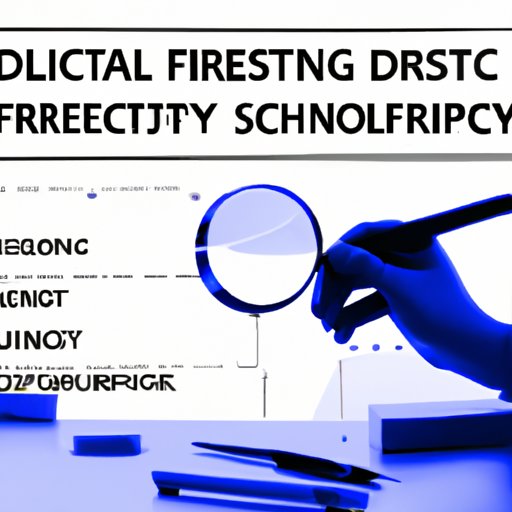Introduction
Forensic science is an interdisciplinary field that combines elements of biology, chemistry, psychology, and law enforcement to investigate criminal activity. Students interested in entering this field have a variety of educational options available to them, including a major in forensic science. In this article, we’ll explore what you’ll learn in a forensic science degree program, outline potential career paths, and discuss the skills gained from pursuing this major. We’ll also look at the realities of working in forensic science, and provide information on the cost considerations for pursuing this major.
What You’ll Learn in a Forensic Science Degree Program
A major in forensic science typically consists of courses in chemistry, biology, physics, mathematics, and criminal justice. Depending on the institution, students may be able to specialize in forensic pathology, forensic psychology, or forensic anthropology. According to the American Academy of Forensic Sciences, some programs may offer additional concentrations in areas such as toxicology, entomology, questioned documents, or trace evidence.
At the bachelor’s level, students will take courses such as physical evidence collection, digital forensics, forensic chemistry, criminalistics, and crime scene investigation. They will also likely participate in an internship in order to gain practical experience in a real-world setting.
At the master’s level, students may be able to specialize in specific areas, such as forensic toxicology, forensic genetics, or forensic psychology. Additionally, they may be able to take courses in advanced crime scene investigation techniques, evidence analysis, and legal procedures.

Career Options with a Forensic Science Major
With a degree in forensic science, graduates can pursue a range of career paths. Potential employers include law enforcement agencies, government laboratories, and private forensic labs. Job roles and responsibilities may include collecting and analyzing evidence, testifying in court, and consulting with attorneys and investigators.
Common job titles for forensic science majors include crime scene investigator, forensic scientist, forensic toxicologist, forensic psychologist, and forensic biologist. According to the Bureau of Labor Statistics, the median annual wage for forensic science technicians was $59,150 as of May 2018.

Steps to Becoming a Forensic Scientist
The path to becoming a forensic scientist begins with earning a bachelor’s degree in forensic science or a related field. Depending on the type of job sought, students may need to complete a master’s degree in forensic science or a related field. Most entry-level positions require a minimum of a bachelor’s degree.
In addition to a degree, there are other requirements for becoming a forensic scientist. Many states require applicants to be licensed or certified. Licensing and certification requirements vary by state, so it’s important to research the specific requirements for the state in which the applicant wishes to work. Professional development opportunities, such as attending conferences and workshops, are also important for staying up-to-date on the latest trends in the field.
Skills Gained from a Forensic Science Major
Earning a degree in forensic science can provide students with a range of technical and analytical skills. Technical skills include proficiency in laboratory equipment, computers, and software used in crime scene investigations. Analytical skills include problem-solving, critical thinking, and data analysis. Communication skills are also important, as forensic scientists often need to explain their findings to investigators, prosecutors, and attorneys.
According to a survey by the American Society of Crime Laboratory Directors, the most important skills for a forensic scientist are accuracy, attention to detail, and the ability to effectively communicate complex scientific concepts. These are all skills that can be developed through a major in forensic science.

Exploring the Realities of Working in Forensic Science
Working in forensic science can be both rewarding and challenging. On the one hand, it provides the opportunity to make an impact in the criminal justice system by helping to solve crimes and bringing criminals to justice. On the other hand, it can be a stressful and demanding job, requiring long hours and intense concentration.
The National Institute of Justice found that the most common challenges faced by forensic scientists are heavy workloads and limited resources. Other challenges include dealing with difficult witnesses, navigating complex regulations, and managing conflicting opinions. It’s important to consider these realities when deciding whether to pursue a major in forensic science.
Cost Considerations for Pursuing a Forensic Science Major
The cost of pursuing a major in forensic science can vary depending on the institution and program. Tuition and fees for a bachelor’s degree in forensic science can range from $20,000 to $50,000 per year, while a master’s degree can cost anywhere from $30,000 to $100,000 per year. Financial aid and scholarship options are available to help offset the cost of tuition.
Additionally, many schools offer online programs in forensic science, which can provide greater flexibility and lower costs than traditional programs. Online programs typically require fewer credits and may offer discounted tuition rates.
Conclusion
A major in forensic science can open up a range of exciting job opportunities. Students will gain technical, analytical, and communication skills that are essential for success in this field. Before committing to a major in forensic science, it’s important to consider the cost and the realities of working in this field. With the right preparation and dedication, a major in forensic science can lead to a rewarding and successful career.
(Note: Is this article not meeting your expectations? Do you have knowledge or insights to share? Unlock new opportunities and expand your reach by joining our authors team. Click Registration to join us and share your expertise with our readers.)
